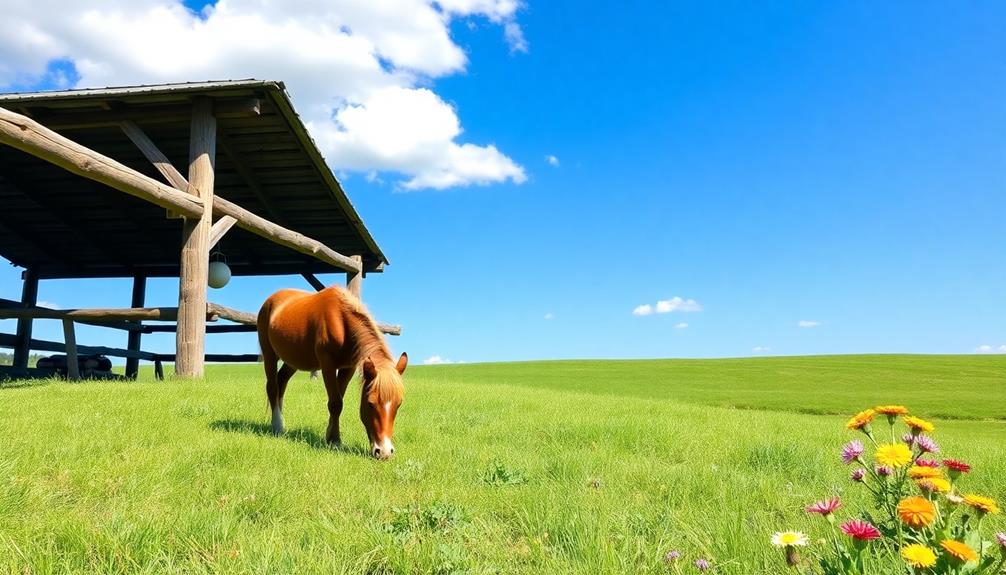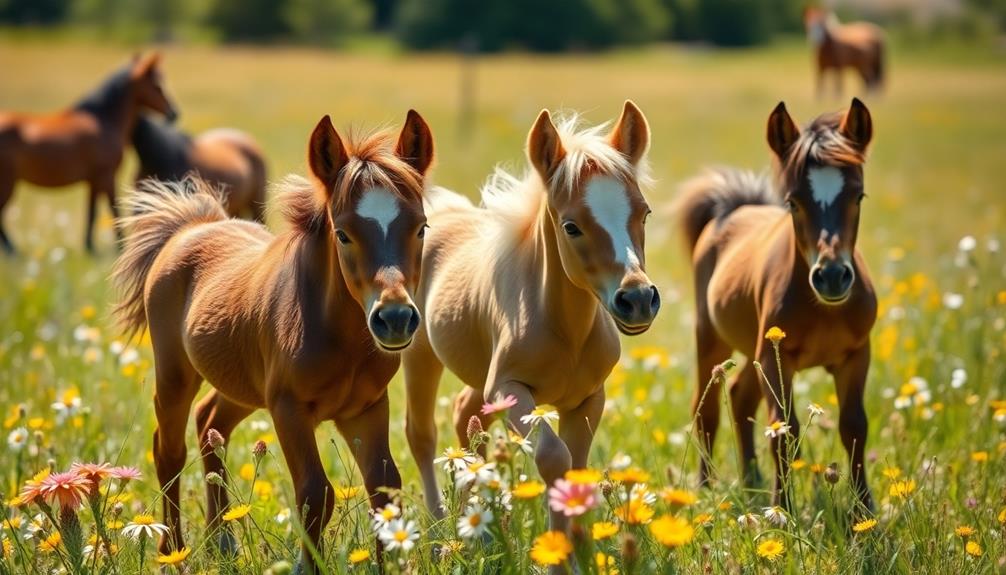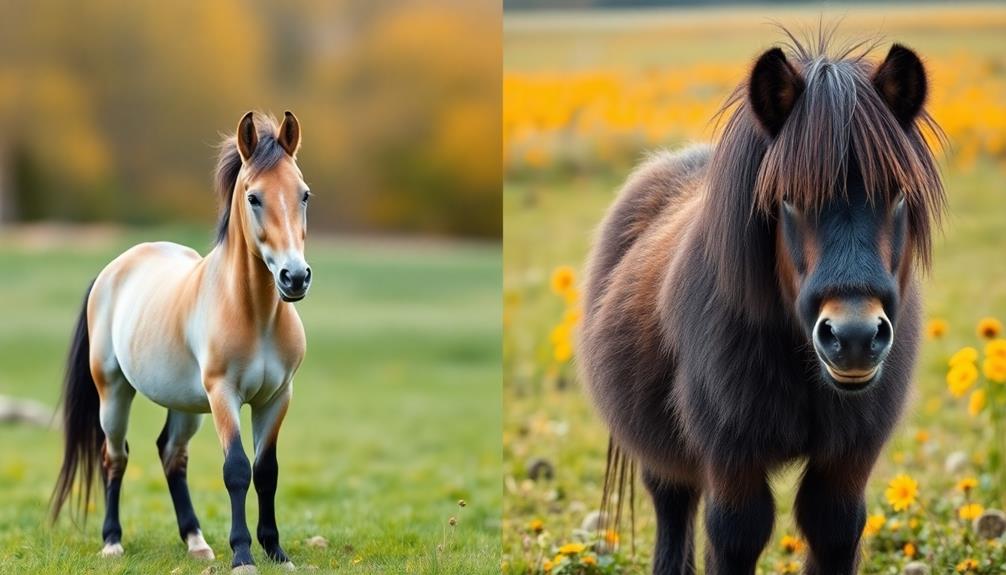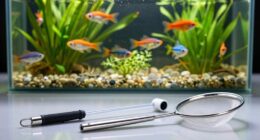Yes, mini horses can live outside, but you need to provide the right conditions. They thrive in companionship, so keep at least two together to prevent loneliness. Proper shelter is crucial; make sure it's windproof and offers good airflow. Use extra hay in colder climates to maintain their energy, and always provide fresh water. Regular vet check-ups are essential for their health, especially during extreme weather. Monitor their behavior and comfort levels closely. There's much more to make sure their happiness and well-being, so let's explore what else you need to know to keep your mini horse thriving outdoors!
Key Takeaways
- Mini horses thrive outdoors when kept in pairs, as companionship is crucial for their well-being and reduces stress.
- Provide windproof shelters with good airflow, facing south for warmth, to protect mini horses from harsh weather conditions.
- Fresh water must always be accessible, preferably in sheltered areas, to prevent freezing and ensure hydration throughout the year.
- Regular veterinary care, including vaccinations and deworming, is essential for maintaining the health of mini horses living outside.
- Monitor individual comfort levels, as mini horses may seek shelter only in severe weather, highlighting the need for attentive care.
Mini Horse Living Conditions

When it comes to mini horse living conditions, making sure they've companionship is vital; these social animals should never be left alone. If you're keeping a horse, consider having at least one other miniature horse to provide the necessary social interaction.
They thrive in well-ventilated shelters that protect them from harsh weather, with a minimum stable size of 2m x 2m recommended, though larger is better for comfort and movement.
Mini horses have thick winter coats that help them adapt to cold conditions, but they still need adequate shelter to stay warm and dry. Proper pasture rotation is important to prevent overgrazing, maintaining healthy grazing areas.
Make sure they've sufficient exercise space to promote their physical well-being, as these active creatures benefit from regular movement. Additionally, access to unfrozen water is essential, especially in winter when they may drink more.
Using water deicers or warmers can help prevent freezing, making sure they stay hydrated. By paying attention to these vital living conditions, you'll create a nurturing environment for your miniature horse that fosters both their happiness and health.
Essential Shelter Features
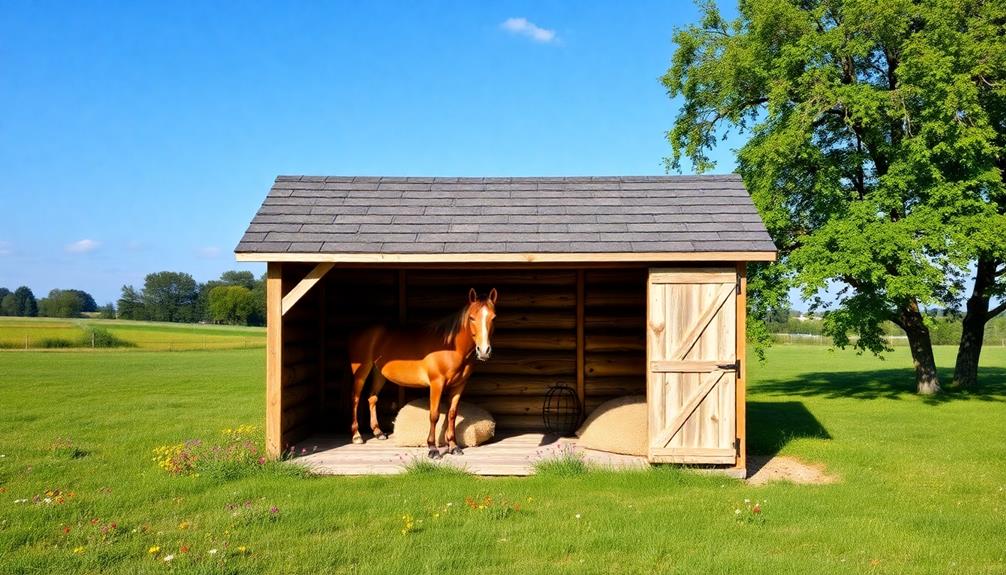
To guarantee your miniature horse stays healthy and comfortable, providing a well-designed shelter is essential. Here are some key features to take into account when building or choosing a shelter for your mini horse:
- Windproof Design: Ensure your shelter protects against harsh winds, especially during storms or extreme temperatures. A 3-sided run-in shed works well, ideally facing south to maximize warmth.
- Sufficient Space: Your mini horse needs enough room to move comfortably. Cramped spaces can lead to hoof issues and affect overall health, so plan for adequate dimensions.
- Good Airflow: While you want to keep your mini horse protected, the shelter should also promote airflow. Avoid trapping heat, as excessive warmth can cause respiratory problems.
- Free Access: Allowing your mini horse to enter and exit the shelter freely encourages natural behavior. This access helps them seek refuge when necessary, enhancing their mental and physical well-being.
Climate Considerations for Outdoor Living

When it comes to winter weather, your mini horse needs a solid plan for outdoor living.
Ensuring they've adequate shelter, access to fresh water, and monitoring their comfort can make all the difference in their health and happiness.
Let's explore how to keep your mini horse safe and comfortable during those chilly months.
Winter Weather Adaptability
Miniature horses are well-equipped to handle winter weather, thanks to their thick winter coats that provide excellent insulation against the cold.
However, to guarantee your mini horse thrives in outdoor living during winter, consider the following key points:
- Windproof Shelters: Provide access to windproof shelters to protect your horse from harsh winds and snow. This is essential for their comfort and health.
- Hydration: Keep your mini horse hydrated. They may drink more water than expected in winter, so offering heated water sources can prevent freezing and encourage hydration.
- Outdoor Movement: Encourage outdoor movement. Studies show that horses kept outdoors have better circulation and fewer respiratory issues, so let them roam and exercise.
- Monitor Comfort Levels: Pay attention to your horse's behavior and health. Individual comfort levels vary, so regular monitoring will help you spot any issues early.
Shelter Requirements
Providing adequate shelter is essential for miniature horses, especially as you consider the various climate factors impacting their outdoor living conditions. Mini horses require windproof shelters to protect them from harsh weather. While they've thick winter coats for insulation, they still need protection from snow and rain.
A well-designed run-in shed should face south, maximizing warmth and blocking prevailing winds to keep your mini horse comfortable during cold weather.
It's important to note that while mini horses can adapt to outdoor living, they shouldn't be left without shelter, particularly during extreme weather events. They tend to seek refuge only when conditions become severe, which can put their health at risk.
Sufficient shelter not only protects them but also allows them to exhibit natural behaviors, improving their mental and physical well-being by giving them the choice to be outside or indoors.
Keep in mind that climate considerations, such as regional winter temperatures and snowfall, influence the type of shelter needed.
Regularly monitor your mini horses for comfort and health to guarantee they're thriving in their outdoor environment.
Hydration Essentials
Keeping your mini horse hydrated is fundamental, especially in outdoor living situations where access to fresh, unfrozen water can be a challenge.
Horses can't rely on snow for hydration during winter, so it's essential to guarantee they've consistent access to water. In colder temperatures, they may actually consume more water, making it fundamental to take extra precautions.
Here are four key hydration essentials for your mini horse:
- Water Deicers: Use water deicers or warmers to prevent the water from freezing, encouraging your mini to drink.
- Regular Monitoring: Check their hydration levels regularly, especially after cold snaps, to help prevent colic and guarantee their well-being.
- Sheltered Water Sources: Provide water in sheltered areas to shield it from harsh weather conditions.
- Digestive Health: Remember that maintaining hydration is essential for your mini's digestive health and energy levels.
Dietary Needs and Feeding

When caring for your mini horse, it's essential to focus on their forage requirements.
Make sure they've access to high-quality hay or grass, as this should make up the bulk of their diet.
Additionally, don't forget about hydration—always provide fresh water to keep them healthy and energized.
Forage Requirements
Miniature horses thrive on a diet rich in forage, making it essential for their overall health and well-being. Providing continuous access to high-quality hay is vital, as it helps with warmth, hydration, and preventing colic. Aim for about 10% of your mini horse's body weight in hay daily.
Here are some key forage requirements to keep in mind:
- Adjust for Weather: In colder temperatures, you may need to increase hay rations, sometimes up to two bales per week, to maintain energy levels.
- Monitor Body Condition: Regularly check your horse's weight to avoid obesity, particularly in breeds like Shetland ponies that can easily gain weight.
- Limit Grain: Excess grain can be harmful; high-quality hay typically meets their needs for vitamins and minerals.
- Use Slow-Feed Nets: These help regulate intake and prevent overeating, especially in mini horses prone to weight gain.
Hydration Essentials
Maintaining your miniature horse's proper hydration is critical for its health, especially during colder months when water consumption can drop. Unlike larger horses, miniatures can't rely on snow for hydration, so you must provide continuous access to fresh, unfrozen water. Check on their water supply frequently, especially when temperatures dip.
In winter, increasing hay rations becomes important. It helps maintain energy levels and prevents their stomachs from being empty, which can lead to colic. Monitor your horse's body condition regularly to differentiate between weight gain from winter fluff and actual fat. This regular assessment guarantees you can adjust feeding accordingly.
Consider using slow-feeder nets to help regulate your mini horse's forage intake. This method not only prevents overeating but also allows for continuous access to hay, which is essential for both warmth and hydration.
In colder climates, you may need to provide up to 2 bales of hay per week. Always prioritize high-quality hay over excess grain to avoid health issues like laminitis.
Health and Veterinary Care
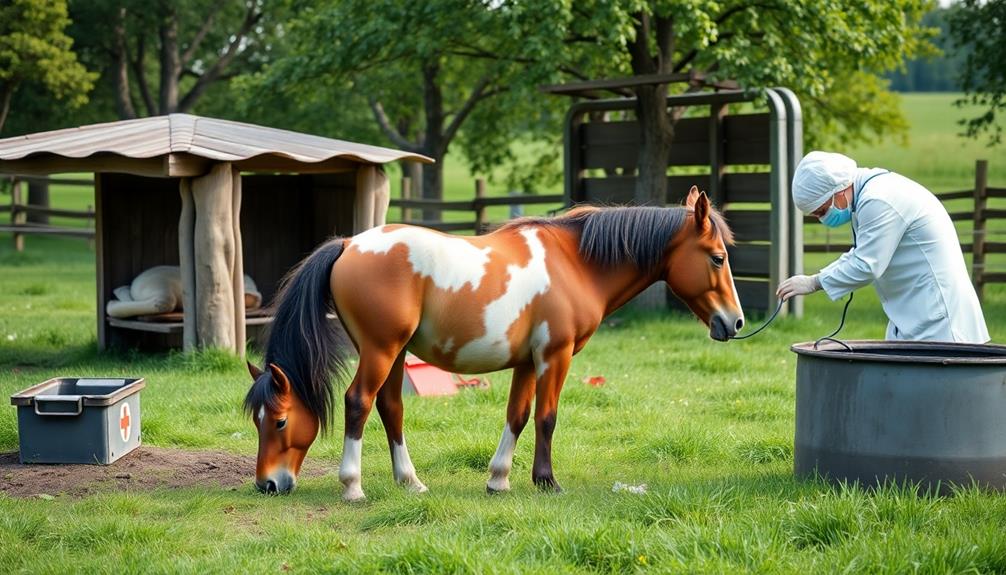
Regular veterinary check-ups play an essential role in maintaining your mini horse's health.
These visits help monitor your horse's overall well-being and guarantee they're up-to-date on necessary vaccinations and deworming, which should occur 3-4 times a year.
While mini horses can thrive outdoors, consistent observation is vital, especially during extreme weather.
Here are four key health management tips:
- Provide Adequate Shelter: Make sure your mini horse has access to windproof shelters to protect them from harsh elements, particularly in cold climates.
- Monitor Body Condition: Regularly assess your horse's body condition to distinguish between healthy weight and obesity, which can lead to serious health complications.
- Stay Hydrated: Keep an eye on their water intake, especially in winter. Use water deicers or warmers to prevent freezing.
- Watch for Signs of Illness: Be vigilant for any signs of distress or illness, and consult your vet if you notice anything unusual.
Socialization and Companionship
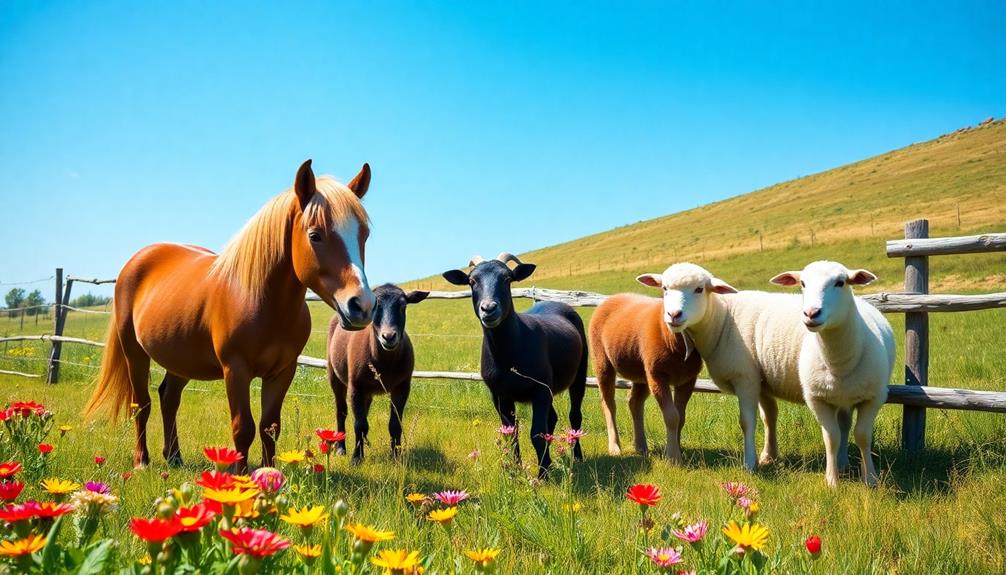
Companionship is fundamental for your mini horse's happiness and well-being. These miniature horses are highly social animals that thrive on interaction with others. Ideally, you should keep at least two horses together to prevent loneliness and the stress that comes with isolation.
Their natural herd instincts mean that being alone can lead to anxiety or depression, so socialization is imperative. In outdoor settings, providing multiple horses allows them to engage in natural social behaviors, enhancing their overall happiness.
If you can, consider adopting pairs of mini horses to meet their social needs effectively. This arrangement not only fosters companionship but also helps maintain a healthy emotional state for your mini horse, which is essential for their physical health as well.
Regular interaction with other equines can reduce the risk of health-related problems associated with isolation. When you prioritize companionship, you're investing in your mini horse's quality of life.
Seasonal Care Adjustments
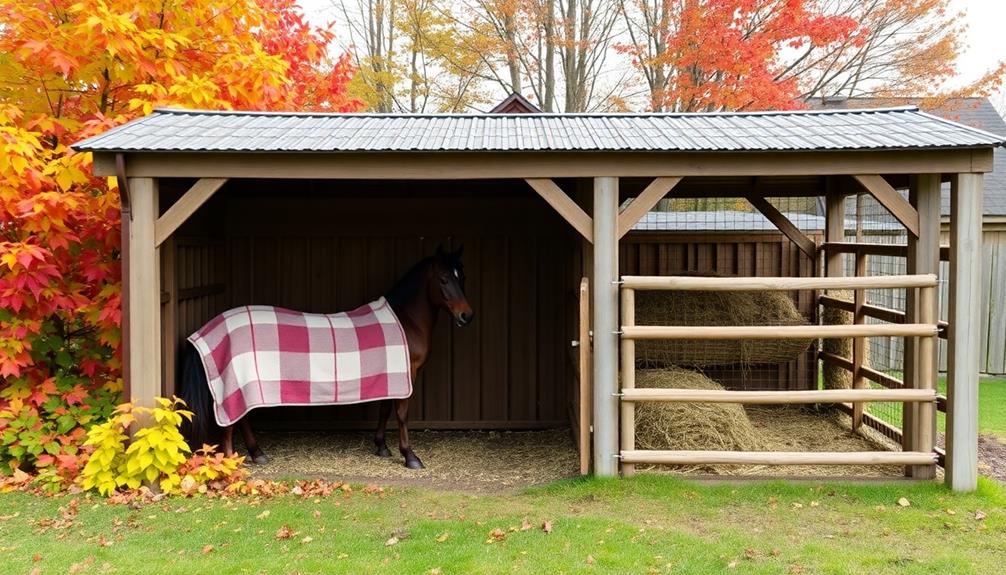
Seasonal changes bring unique challenges to mini horse care that require your attention. While miniature horses can live outside year-round, you'll need to adjust their care based on the weather conditions.
Here are four important considerations for seasonal care adjustments:
- Winter Shelter: Verify your mini horse has access to windproof shelters. This protects them from harsh weather and helps maintain their body heat.
- Increased Forage: During winter, provide extra forage. They need additional hay rations to sustain their energy levels in colder temperatures.
- Hydration: Hydration is vital year-round. In winter, consider using heated water sources to guarantee they've access to fresh, unfrozen water, as they may drink less in the cold.
- Body Condition Monitoring: Regularly assess your mini horse's body condition, especially in winter. A thick coat can mask weight changes, so keep a close eye on their health and adjust their nutrition as needed.
Behavior and Adaptability

Understanding your mini horse's behavior and adaptability is essential to ensuring their well-being throughout the year. These remarkable creatures are quite resilient and can handle cold weather better than you might expect. They often prefer living outdoors, even in harsh conditions, as long as they've access to shelter. Their thick winter coats provide excellent insulation, helping them maintain warmth during colder months.
Outdoor living can actually enhance your mini horse's overall health. It promotes better circulation and reduces the likelihood of respiratory issues that can arise from being kept in stalls.
However, it's important to remember that individual comfort levels vary. Some mini horses might only seek shelter during severe weather, showcasing their natural instincts to find protection when necessary.
Regularly monitoring your mini horse's behavior is vital. Changes in their environment or turnout arrangements can greatly impact their adaptability and well-being.
Owner Insights and Experiences
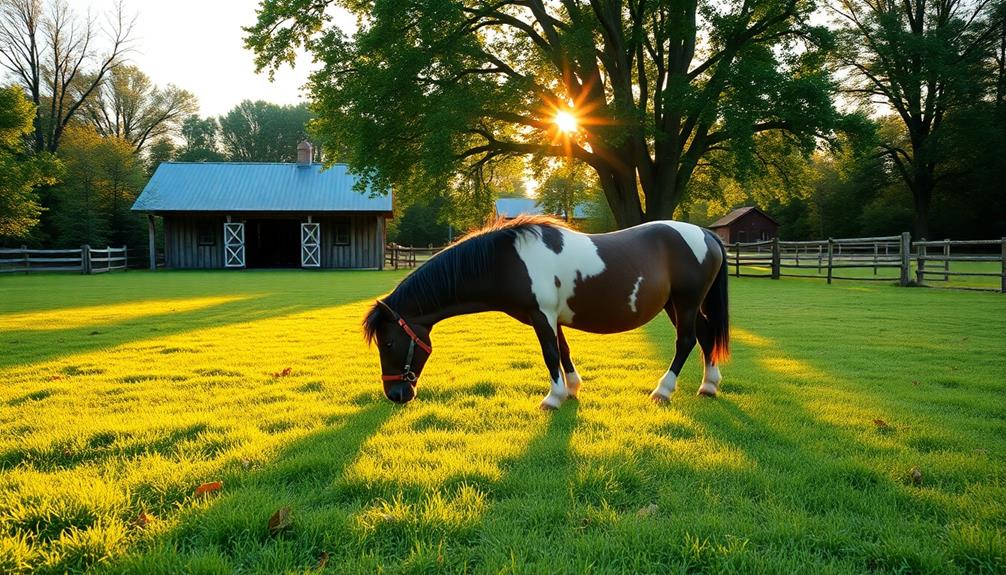
Many mini horse owners find that their pets flourish when allowed to roam outdoors full-time.
With the right setup, your mini horse can thrive in outdoor living, enjoying the freedom to engage in natural behaviors and stay active.
Many owners report noticeable improvements in health and happiness when their horses are given this opportunity.
Here are some key insights from owners who've made the switch to full-time outdoor living:
- Windproof Shelter: Confirm your mini has access to a secure, windproof shelter to protect them from harsh weather.
- Regular Health Monitoring: Keep an eye on your horse's health and behavior, as individual comfort levels may vary.
- Fewer Respiratory Issues: Many owners note that outdoor horses experience fewer respiratory problems compared to those kept in stalls.
- Increased Physical Activity: Outdoor living encourages more movement, leading to healthier and happier mini horses.
Frequently Asked Questions
Can Mini Horses Live Outside?
Yes, mini horses can live outside. They need proper shelter, fresh water, and social interaction. Their thick coats help them adapt to cold weather, but guarantee they have companionship to maintain their emotional well-being.
Can You Keep a Miniature Horse in Your Backyard?
Sure, you can keep a miniature horse in your backyard, but don't expect it to be a low-maintenance pet. They need companionship, adequate space, proper fencing, and regular vet care to thrive happily.
How Cold Is Too Cold for Miniature Horses?
Mini horses can handle cold weather, often thriving in temperatures down to 20°F. However, you should provide them with windproof shelter and monitor their behavior to guarantee they stay comfortable and healthy in harsh conditions.
How Big of a Yard Do You Need for a Mini Horse?
For a mini horse, you'll need at least 0.1 to 0.25 acres, giving them room to roam and graze. A spacious yard guarantees their happiness and health, so plan accordingly for their needs.
Conclusion
To sum up, a mini horse can thrive outside, much like a flower blooming in the right conditions. By providing adequate shelter, proper nutrition, and regular veterinary care, you'll help your little equine friend flourish. Remember, they need companionship and socialization, so don't let them feel isolated. With your dedication and love, your mini horse will not only survive but truly thrive in their outdoor home, bringing joy and warmth to your life.
